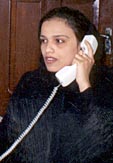
Telephone Operators: Unappreciated Workers! [Archives:1999/20/Reportage]
May 17 1999
One of the cornerstones of any company, government office, school, or whatever organization you can name is its communication lines. It is, in fact, its lifeline. In most organizations, this is done through the switchboard.

“The reason is that women are generally more patient,” says Intissar Al-Ammari, operator at Adhban Company. Tayyibah Al-Khayyat of the Yemen Bank for Reconstruction & Development. She also thinks the reason is that ‘women are more courteous’.
Haifa Abdul-Jaleel of Al-Huraibi Hospital believes it is because of the soft voice of women. Ikram Abdul-Wali of the International Bank of Yemen feels women can save awkward situations by taking the blame. When the boss forgets to answer a call, it is because the operator forget to tell him. Khadijah Tayghoor of Interwood Company believes women can put up with a lot more than men.
That is why it has become a female-dominated job.
Telephone operators can never aspire to be rich. This is a low-paying job.
The lowest salary for a telephone operator was earned by Fathiyah Al-Mahfadi at Yemen Gas Company. She earns YR 7000 per month, and the highest in the sample went to Hana Ali Ahmed of Trust Insurance and Re-Insurance Company at YR 30,000 a month. By far, the majority carry home around YR 13,000 a month.
But the salary depends on many factors, length of service, ability, and efficiency.
Most switchboards are an enclosure, which one can call a room tucked away somewhere in the building, often on the ground floor near the main entrance. The lighting is often dim, and the room is small and comfortable.
The job has many problems.
First and foremost, there is no directory that the operators can refer to in their work. That is why they have to create their own directories. To meet this problem, telephone operators have established a network of friendships among themselves which they tap for getting numbers they do not know. But the main trick in doing the job is to memorize as many numbers as possible, especially those that are needed frequently.
“I know by heart over 600 numbers,” says Hanan Ahmed of the Yemen Commercial Bank. The majority of operators remember between 150-200 numbers off the top of their heads. Wafa Ad-Duwais of Al-Watani Bank says she has successfully used 118, the communications telephone directory. But many of her colleagues said they were not as successful in using 118.
One of the most difficult aspects of this job is the pressure that comes with it. “When the boss wants someone immediately, my heart starts beating faster than normal. If I have the number, the job is easier. If I don’t, I start a number-hunt. Sometimes, you are not lucky, the number is busy or it is out of order, or has been changed. The pressure I endure until I put my boss through is enormous,” said an experienced operator.
Another one has a different set of problems. Najat Salim of Yemeni Company for Group Land Transport says, “Some people call for fun. They hold the line, and they flirt. It is my job to handle them in a way that does not hurt my company’s image. It takes a lot of skill, and a lot of sweet-talking.”Indeed, nearly 79% of the telephone operators surveyed complained against idle talk by people who make random calls.
How has technology affected this field? Most switchboards are a simple telephone set with multiple lines. Some companies like Universal Group of Companies have computer sets to help in storing numbers. But the telephone set itself has yet to be connected to the computer to place a call. Other companies have automatic answering machines for those who know the extension number of the person they want to reach.
“Technology cannot replace us,” the operators agree.
Ahlam Al-Khawlany,
Yemen Times
——
[archive-e:20-v:1999-y:1999-d:1999-05-17-p:./1999/iss20/report.htm]


